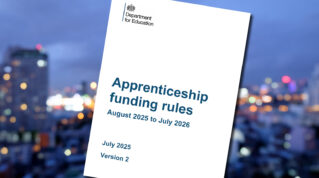Reforms to apprenticeships, funding and assessment will be top of the agenda at this year’s Apprenticeships and Training Conference. But what do apprentices think? Jessica Hill finds out
No one suffers more from the flaws in our apprenticeship system than apprentices themselves, and no one has a better insight into what upcoming reforms to the system will look like at ground level.
Yet their voices have been absent from much of the policy debate, with Skills England seemingly under no obligation to consult apprentices when deciding on future skills demand.
Emily Rock, chief executive of the Association of Apprentices (AoA) (which advocates for apprentices) believes apprentices are “too often left out of the conversations that impact them the most”.
So, to hear their perspectives on reforms, AoA convened a roundtable of 30 apprentices of various ages, levels and sectors to speak to FE Week.
Their responses were at times surprising, and not all changes were met with approval.

Flawed functional skills
Ministers presumably announced their plans to ditch the requirement for adult apprentices to take functional skills during National Apprenticeship Week believing it would land well with apprentices.
But that’s not the case. Only 40 per cent of apprentices surveyed by AoA for FE Week thought it was a positive move that will support access to apprenticeships, while 14 per cent opposed the change and 46 per cent had mixed views or were undecided.
As a non-native English speaker, Anna Muller, who last month completed her level five people management apprenticeship, feels “quite lucky” to have been mandated to take functional skills English as it is “absolutely crucial” for her to have “good writing and speaking skills” in her human resources job.

But she also believes much of what she learned in the maths component was unnecessary, and said: “As a people professional, it’s not like I need to know the volume of a cylinder on a daily basis.”
Mansimranjeet Singh, taking a level six digital and technology solutions programme, believes having a grasp of basic maths and English was “vital” for his job as a software engineer when doing his level four apprenticeship at age 19.
He expressed concern about the lack of “information or guidelines” about “how that gap be covered for those fields that do require [functional] skills and knowledge”.
The change comes too late for learners who dropped out of their apprenticeships after failing functional skills.
Although the change only covers adults, many believe the removal of the requirement should be extended to younger apprentices too.
Analysis by software platform Aptem confirms 16 to 18-year-old learners facing a functional skills component are more likely to drop out.

It’s data on around 18,000 learners shows in the 2023-24 academic year, 16-18 age level 2 and 3 apprentices with a functional skills need had a non-completion rate of 66 per cent, compared to 45 per cent of learners who had already passed their maths and English GCSEs.
The impact was greater for advanced (level three) apprentices with a functional skills need, with 74 percent withdrawing, compared to 64 percent of intermediate (level two) learners.
Victoria Treiber, 25, who is taking a level three HR support apprenticeship, described how an autistic friend – “one of the most hard-working people I’ve ever met” – became “stressed out no end” by his six attempts to pass a maths qualification to complete a hospitality apprenticeship. “I just feel that shouldn’t have been a barrier for him,” she said.
She believes the reform will “create more of a pathway for those who might not have seen apprenticeships as an option because they were put off by functional skills”.

Unintended consequences
But Kieren Buxton, East of England co-chair of the Apprenticeship Ambassador Network, worries the change will make it even harder for those without GCSE maths and English to get onto apprenticeship programmes.
Buxton, an apprenticeship training manager, finds that training providers who “aren’t very good” at delivering functional skills raise the benchmark to require all apprentices have passed GCSE English and maths, thereby “ruling out” those without the qualifications “before they even get to talk to that employer or trainer provider”.
He believes functional skills should be “built into” apprenticeship standards “linked directly to the role” rather than being a standalone qualification, so that apprentices “appreciate” the value of that learning.
Alexia Williams, who recently completed a level seven through-life engineering apprenticeship, believes the age threshold at which apprentices no longer need to take functional skills should have been raised to 25.
She fears the reform will now incentivise young people to put off their apprenticeship until they hit 19. She said: “If it was [raised to] 25, they’d probably crack on straight after 16 and just get their functional skills done.”

Axing level 7
Skills minister Jacqui Smith has indicated the government intends to axe funding for level 7 apprenticeships, which was an unpopular move among most of the apprentices we spoke to.
The government appears to be hoping employers will fund programmes instead, and there have been suggestions that degree apprenticeships should be funded by apprentices taking student loans, as higher education students do.
But Amy Norton, a level seven senior people professional apprentice who sits on the Disability Apprentice Network, said she and her partner are “looking to try for children”, and as a same-sex couple this “incurs a cost” that would have made the masters in human resources she currently studies unaffordable.
Yasmeen Bey will soon complete her level 6 digital and technology solutions apprenticeship and wants to do a level seven in artificial intelligence. She is concerned that if she paid to do a part-time masters in the subject instead, there would be “no guarantee” of her training time being “protected” by her employer, as is currently the case.
“I’d be trying to balance the masters on the side of my full-time job”, she explained.
Protected time is a “massive benefit” of apprenticeships, according to Rock.
Three-quarters of the over-2,000 apprentices surveyed by AoA last November valued the opportunity their apprenticeship gave them to gain work experience alongside a qualification, which level seven defunding “throws up in the air”.
However, level 7 accountancy apprentice Malachi Swen believes his employer will swallow the cost of his programme without levy funding. Having seen “a lot of companies” use the funding to “send top management to get an MBA” he supports more “regulation about what companies can use their levy funding for”.
Similarly, Alexia Williams was the youngest person on her level 7 course “by at least 10 years”, and most of the others – who were “already in management roles” – “could have afforded to get that training anyway”.

Creating barriers
The AoA survey also highlighted the role apprenticeships play in promoting social mobility, with 40 per cent of apprentices who received free school meals saying they would not be working in their current industry without access to an apprenticeship.
For school leaver Nawal Bin-Sheikh, the level 7 solicitor apprenticeship has been “transformative” as she “wouldn’t have been able to afford to go to university”.
Taking out a student loan “would have also been very difficult because it goes against my personal beliefs”, she added.
Bin-Sheikh pointed out that many solicitor apprentices are in higher tax brackets by the time they qualify, therefore “contributing back to the economy quite significantly”.
Solicitor apprentice Amaara Latif said level 7 defunding would create “barriers” for those at her firm who were encouraged to take level 3 paralegal apprenticeships in order to progress onto the solicitor apprenticeship.
Reflecting on this challenge, paralegal apprentice Lucy Jackson said the threat of defunding makes her feel “frustrated” that her progression will be “capped”.
It seems the prospect is already impacting some law firms’ staffing decisions. Jackson said many firms in her home city of Newcastle are not hiring solicitor apprentices this year due to concerns over the programme being defunded.
End point assessment reform

Apprentices are currently assessed by independent end point assessment organisations (EPAOs) and long waits for assessment, often caused by a shortage of assessors, has led to apprentices quitting at that final hurdle.
To address the problem, the government is letting training providers sign off some parts of their apprentices’ assessments themselves, while responsibility for assessing the ‘behaviour’ elements of standards will be transferred to employers.
From next month onwards, Skills England will deliver the changes by reviewing and updating standards.
All the apprentices FE Week spoke to welcomed these changes, particularly those who had suffered long waits themselves.
Although Rock said sector “best practice” dictates that apprentices should be told upon starting their programmes when their end point assessment will be, that was not the case for the apprentices FE Week spoke to.
After completing her level three team leader programme, Norton felt “ready” for her employee assessment but had to wait another three months for it to take place.
She works at a local authority with apprentices who are often “stuck waiting for a significant period of time” for end point assessments – past the point at which their employment contracts are set to end.
End point anxiety
Of the 62 per cent of apprentices surveyed by AoA who reported feeling stressed or anxious in the last 12 months, 38 per cent blamed their turmoil on end point assessments.
Level 3 accounts assistant apprentice Qasim Shah said that “many people fail” the call with an external assessor that his programme demands, “normally because of anxiety”.
He recalled how, during a previous 18-month level four apprenticeship, there was “no way to track your progress or knowledge” until the end of the programme, when “all of a sudden, everything came crashing down.” The sudden “pressure” caused some apprentices to quit.

Solicitor apprentice Charity Lockie had seen some dropouts caused by “confusion” between employers and providers regarding end-point assessments, with communication sometimes lacking between organisations.
Alexia Williams felt her two previous engineering apprenticeships’ end point assessments were “a bit pointless”. But on her current level 7 apprenticeship, the assessment is part of her master’s degree (in through-life engineering systems) dissertation and presentation. Overall, she feels this is “much better” because “you know that once you finish your master’s you also finish your apprenticeship”.
However, she added “quite a lot” of students on her course are having to redo their master’s dissertation because although they passed the academic course, they did not pass all the apprenticeship knowledge, skills and behaviours criteria embedded within it.
Some are “almost” at the point of giving up, she said, because they “can’t be bothered to redo a year-long dissertation just to tick off two more knowledge, skills and behaviours”.
Shorter courses
From August, the minimum length of an apprenticeship will be slashed from 12 to eight months.

The change would have benefitted apprentices like James Kimble, a level three business administration apprentice at a football club who did “very well” in his coursework and managed to complete and evidence 98 per cent of his apprenticeship within the first nine months of his 18-month course.
Norton believes the change will “open up opportunities for current staff wanting to accelerate their career” and also help employers with “succession planning” in being able to train recruits up quicker.
Meanwhile, apprentices voiced concerns that some apprenticeship standards are currently too niche.
Williams spoke of a friend who “really regretted” embarking on a “very specific” level 6 engineering programme as it restricted them to remaining with one team for four years, rather than getting a broader experience of different departments.
Rock said there was “some support in the sector” for the idea of giving employers a “discretionary percentage” – for example, 20 per cent – of a standard that they could “shape”. It could be spent on something “specific, but not so specific that it ruins somebody’s chances of repivoting their career”.
Bey explained that because the cyber security industry is “certification driven”, no one in her team has a “formal qualification in IT or cyber”. She hopes the government’s promise to increase “flexibility” in what the levy will pay for means the certifications she requires will come under its remit in future – at present each exam costs her over £1,000.
Price of failure

On the issue of exam costs, Kimble wants the government to fund a bursary for apprentices who currently have to repay the cost of exams if they fail them.
“The wages of some particularly low-level apprentices means it’s not currently financially feasible[for them],” he said.
Swen agrees, having had to pay £170 to resit an exam.
Lockie said the issue of who should pay for exams when apprentices fail them is “hugely contentious” for some apprentices.
Rock also highlights it as being a “real problem”. She said: “I know there’s got to be something that encourages people not to fail, to make an effort, but some of it’s really unreasonable.”
Kimble also thinks an informal interview should be mandated to take place between potential apprentices and providers before they embark on a programme to help them understand “what workload to expect” because “a lot of apprentices don’t know what they’re getting into, and they’re quite overwhelmed with trying to manage the coursework”.
Williams, who sits on IfATE’s apprentice panel, will meet with the two new Skills England chief executives next week in the hope of persuading them to retain the panel which has contributed to national policy meetings.
She wants to see them commit to having at least one apprentice at every policy meeting. “We’re telling them to make sure to use us,” she added.

















Can anyone clarify the last point on resit costs? The Gov guidance says “apprentices cannot be asked to pay for costs of training and assessment and are not responsible for resit costs” (https://www.gov.uk/guidance/apprenticeship-gateway-and-resits-for-end-point-assessment-epa#resits-and-retakes). What exam costs are being referred to?
Also, the apprenticeship funding rules already require a formal process for “laying out the workload” and more. See the section “The outcome of the initial assessment” in the funding rules: https://assets.publishing.service.gov.uk/media/67b322eb4e79a175a4c2fd5d/Apprenticeship_funding_rules_2024_to_2025.pdf
What is that last paragraph about? The rules state apprentices cannot be asked to pay for costs of training and assessment and are not responsible for resit costs. Also, the rules already contain requirements to set out expectations and a lot more as part of the initial assessment.